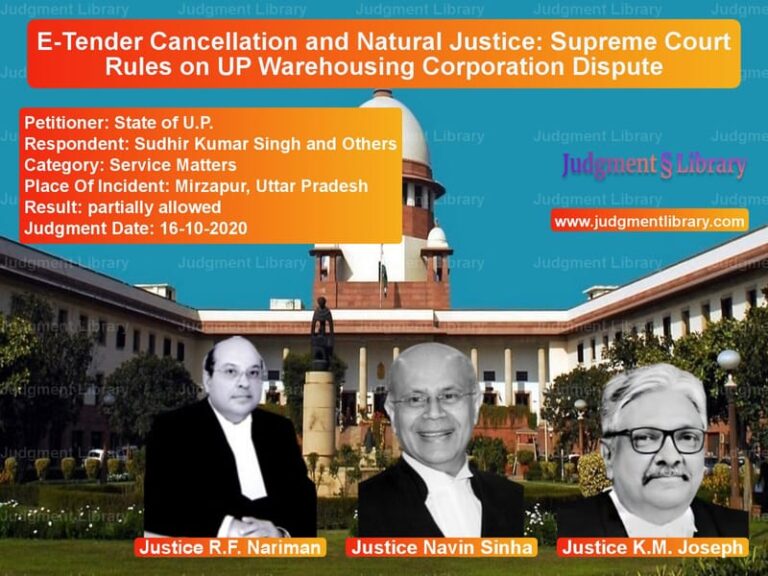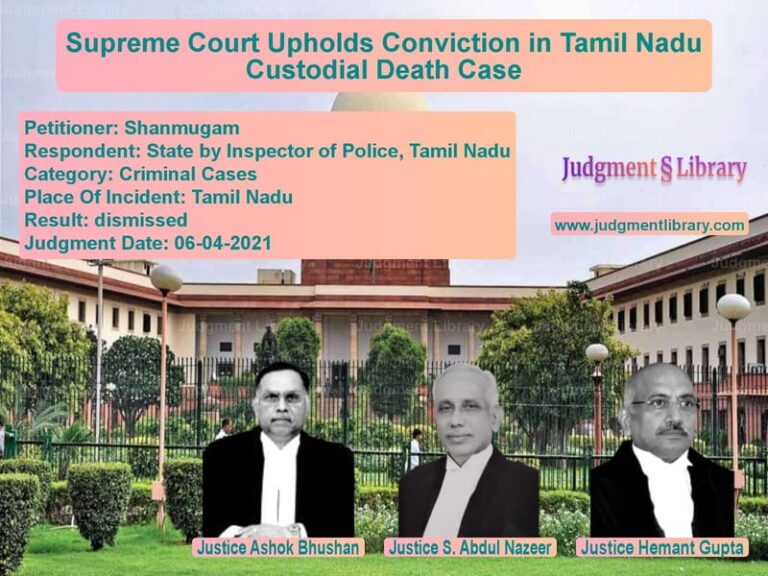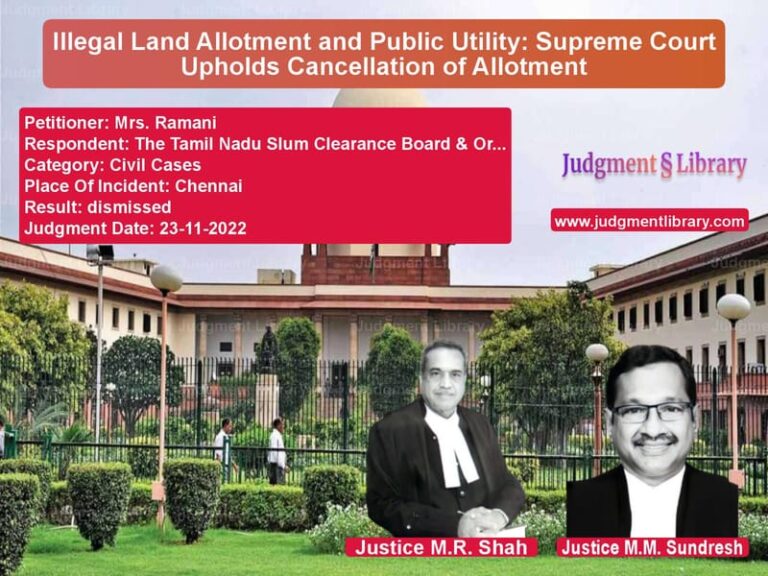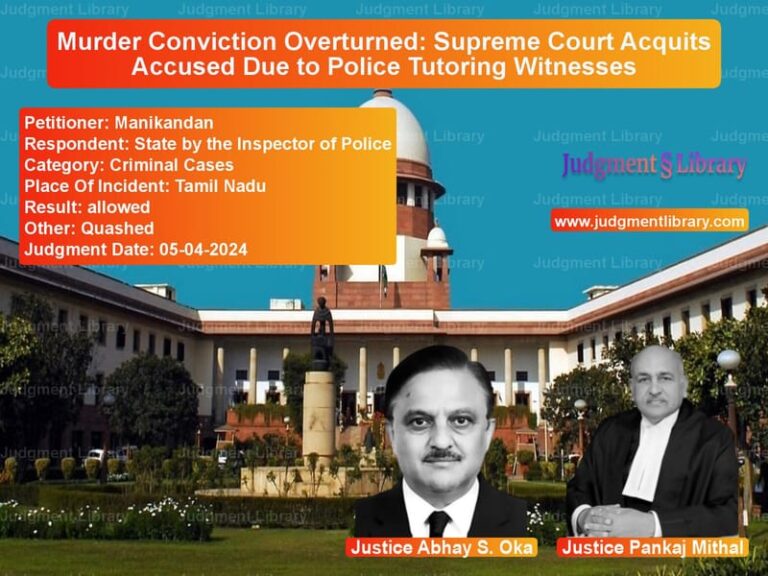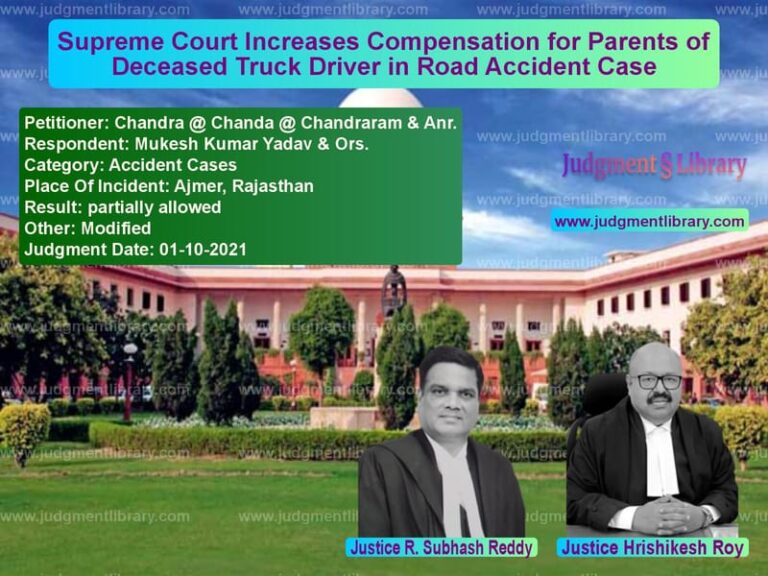Legal Challenges to Land Acquisition: M. Mohan vs State Government of Tamil Nadu
The case of M. Mohan vs The State Government of Tamil Nadu & Ors. revolves around a dispute concerning the procedure for land acquisition under the Tamil Nadu Highways Act, 2001. The case brings to light the procedural issues surrounding the acquisition process, particularly the failure to comply with the mandatory provisions under the Tamil Nadu Highways Rules, 2003. The petitioner, M. Mohan, challenged the acquisition of his land for the construction of highways, citing non-compliance with the prescribed legal procedures.
Background of the Case
The petitioner’s land was required for the construction of a flyover and subway near important road junctions in Tamil Nadu, specifically for the construction of grade separators on Periyar EVR Salai, Nelson Manickam Road, and Anna Nagar 3rd Avenue junctions. The acquisition process was carried out under the provisions of the Tamil Nadu Highways Act, 2001. Following the issuance of a notice under Section 15(2) of the Act, inviting objections to the proposed land acquisition, the petitioner raised his objections regarding the procedure followed in the acquisition process. The primary grievance of the petitioner was that the mandatory procedure under Rule 5 of the Tamil Nadu Highways Rules, 2003, was not followed, and the acquisition was conducted in violation of these rules.
Initially, the petitioner’s objections were not considered properly, and he approached the High Court, challenging the legality of the acquisition process. The Single Judge of the High Court dismissed the petition, holding that there was substantial compliance with the statutory requirements. The Division Bench of the High Court also upheld the decision, which led the petitioner to approach the Supreme Court with a Special Leave Petition (SLP).
The Petitioner’s Arguments
Shri Huzefa A. Ahmadi, learned Senior Advocate for the petitioner, argued that the acquisition procedure was flawed as the mandatory provisions under Rule 5 of the Tamil Nadu Highways Rules, 2003, were not properly followed. According to the petitioner, Rule 5(2) and Rule 5(3) of the Tamil Nadu Highways Rules explicitly lay down the procedure for publishing public notices, conducting hearings, and submitting responses from the Highways Department. The petitioner emphasized that these provisions were not adhered to, resulting in a violation of his rights under the law.
The petitioner argued that Rule 5(2) required that the objections raised by the landowner should be forwarded to the Highways Department, and a response should be provided before the hearing. However, the petitioner claimed that the objection raised on 15.12.2010 was not properly considered and the response from the Highways Department was not received before the hearing conducted on 24.12.2010. Furthermore, the petitioner argued that the enquiry was merely a formality, and the responses from the Highways Department were not adequately considered, which led to a violation of the procedural safeguards provided by the rules.
The petitioner’s counsel also pointed out that the lack of a meaningful opportunity to challenge the responses of the Highways Department and the failure to conduct a fresh enquiry further undermined the fairness of the acquisition process. The petitioner urged the Supreme Court to quash the acquisition, as the process was conducted in violation of the mandatory legal provisions.
The Respondent’s Arguments
On the other hand, the State Government of Tamil Nadu defended the acquisition process, stating that the procedure followed was in accordance with the law. The State argued that the notifications under Section 15(1) of the Tamil Nadu Highways Act, 2001, were issued after considering the objections raised by the landowners, and that the responses from the Highways Department were received and duly considered before proceeding with the acquisition. The State emphasized that the purpose of the acquisition was to serve the public interest by constructing vital infrastructure for the city’s development.
The State also highlighted that the procedure followed by the authorities was consistent with the legal requirements and that there was substantial compliance with Rule 5 of the Tamil Nadu Highways Rules. The State argued that the petitioner’s objections had been considered and that the necessary steps had been taken to notify the landowners and provide them with an opportunity to be heard. The State contended that the acquisition should not be delayed further, as it was essential for the public welfare and development.
The Court’s Analysis
The Supreme Court, in reviewing the case, focused on the procedural issues raised by the petitioner, particularly the failure to follow the mandatory provisions of Rule 5 of the Tamil Nadu Highways Rules. The Court referred to Section 15 of the Tamil Nadu Highways Act, 2001, and the corresponding rules, particularly Rule 5, which lays down the procedure for publishing notices and conducting hearings for land acquisition. The Court noted that the purpose of these provisions was to ensure that landowners and other interested parties had a meaningful opportunity to raise objections and participate in the process.
The Court agreed with the petitioner’s argument that the procedure for hearing objections and considering responses from the Highways Department was not properly followed in this case. The Court pointed out that Rule 5(2) and Rule 5(3) were clear in their requirements, and failure to adhere to these provisions resulted in a denial of the petitioner’s right to a fair hearing. The Court emphasized that the acquisition process should not be conducted in haste or in a manner that undermines the fairness of the process.
Final Judgment
The Supreme Court ultimately sided with the petitioner and allowed the appeal. The Court quashed the judgment and order passed by the Division Bench of the High Court, holding that the acquisition process had been conducted in violation of the procedural requirements under Rule 5 of the Tamil Nadu Highways Rules, 2003. The Court ordered that the acquisition process be reconsidered and conducted in accordance with the law, ensuring that all the necessary steps were properly followed and that the landowner’s objections were given due consideration.
The Court also emphasized that the procedural safeguards provided by the rules were crucial to ensuring transparency and fairness in the acquisition process. The Court directed the State Government to ensure that the land acquisition process was conducted in full compliance with the law and that the rights of the landowners were respected.
Significance of the Judgment
This judgment is significant in reinforcing the importance of adhering to legal procedures in land acquisition cases. The Supreme Court emphasized that even in cases involving public welfare and development, the procedural safeguards must be followed to protect the rights of landowners and other affected parties. The judgment highlights the importance of ensuring transparency, accountability, and fairness in the acquisition process, particularly when it comes to giving landowners a meaningful opportunity to raise objections and participate in the decision-making process.
The ruling also underscores the importance of strict adherence to the provisions of the law and rules governing land acquisition, as failure to comply with these requirements can undermine the legitimacy of the acquisition process and lead to delays and challenges. This case serves as a reminder that legal procedures are in place to ensure that public interests are balanced with the rights of individuals, and those procedures must be followed rigorously to ensure fairness in the process.
Petitioner Name: M. Mohan.Respondent Name: The State Government of Tamil Nadu.Judgment By: Justice M.R. Shah, Justice B.V. Nagarathna.Place Of Incident: Tamil Nadu, India.Judgment Date: 02-09-2022.
Don’t miss out on the full details! Download the complete judgment in PDF format below and gain valuable insights instantly!
Download Judgment: m.-mohan-vs-the-state-government-supreme-court-of-india-judgment-dated-02-09-2022.pdf
Directly Download Judgment: Directly download this Judgment
See all petitions in Property Disputes
See all petitions in Damages and Compensation
See all petitions in Judgment by Mukeshkumar Rasikbhai Shah
See all petitions in Judgment by B.V. Nagarathna
See all petitions in allowed
See all petitions in Quashed
See all petitions in supreme court of India judgments September 2022
See all petitions in 2022 judgments
See all posts in Civil Cases Category
See all allowed petitions in Civil Cases Category
See all Dismissed petitions in Civil Cases Category
See all partially allowed petitions in Civil Cases Category


